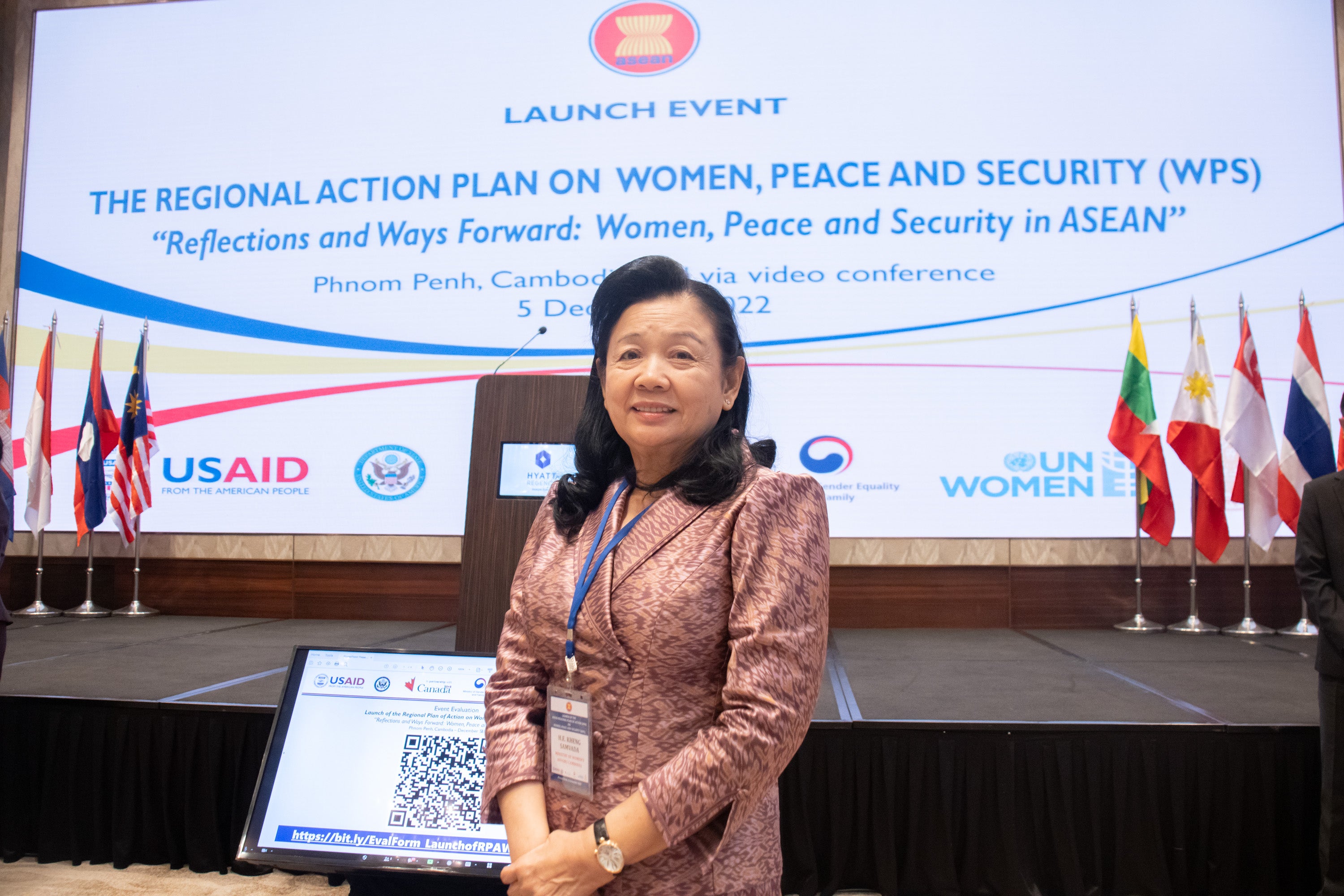Take Five: “The contribution of women and girls to sustaining peace and security will be recognized”
Date:
Interviewed by Yoomi Jun

Kheng Samvada is Permanent Secretary of Ministry of Women’s Affairs of Cambodia and representative of ASEAN Committee on Women Cambodia. She chairs the ASEAN Women, Peace and Security Advisory Group, which led development of the Association of Southeast Asian Nations’ first Regional Plan of Action on Women, Peace and Security. The plan was developed with funding from the Governments of Canada and Republic of Korea. It was endorsed at the 40th and 41st ASEAN Summit in November 2022 and launched in Phnom Penh, Cambodia on 5 December 2022, along with its website and a photo exhibition.
What does the adoption of ASEAN Regional Plan of Action on Women, Peace and Security (RPA WPS) mean for ASEAN and women and girls in the region?
There was a need for a systematic approach with clear plan and strategic direction since the adoption of the Joint Statement on Promoting Women, Peace and Security in ASEAN in 2017, to ensure continued and concerted progress was made and that no aspects of the agenda were excluded. It was even more important for us given the pandemic and emerging threats in our region.
The adoption of this new framework means that there’s a high level of political will and commitment to forge ahead with this pivotal agenda. Also, it means that the contribution of women and girls to sustaining peace and security will be recognized, that women and girls will be acknowledged as agents of change, and their roles in conflict prevention, peacebuilding and mediation will be made visible, with a robust plan and framework for all stakeholders to support them even better.
How does the RPA WPS development link to other efforts made by ASEAN to promote the women, peace and security agenda?
When we developed the RPA WPS, we didn’t start from zero but built on existing ASEAN regional frameworks, especially the ASEAN Comprehensive Recovery Framework, which calls for gender mainstreaming in COVID-19 response and recovery, and ASEAN Vision 2025, which stresses “No one is left behind”.
We also developed a holistic communication and advocacy strategy for the women, peace and security agenda. I am very happy that we will have a ASEAN Women, Peace and Security website and organize a women, peace and security photo exhibition in Phnom Penh.
Could you briefly explain the development of the ASEAN RPA WPS?
The formulation of the RPA WPS included consultations and brainstorming sessions with ASEAN sectoral bodies and institutions across the three “community pillars” (political-security, economic and sociocultural) of ASEAN. We also had a series of interfaces with development partners, the private sector, think tanks, youth groups, and civil society organizations.
We appreciated UN Women and the PROSPECT project funded by United States Agency for International Development. They provided technical support but also facilitated discussions to come up with a regional plan that is understandable, realistic, fits the local context, and is doable by all stakeholders.
What worked well in the RPA WPS development that other regions or countries can learn from?
I’d like to commend the inclusiveness of its development as a best practice for other regions. We convened multiple consultation and brainstorming sessions with different stakeholders, both internal and external to ASEAN and the three community pillars, to hear from different groups of people. We had a goal to ensure that the (plan) is inclusive, sustainable and relevant to everyone.
What are the next steps for the RPA WPS?
The next step for ASEAN is to ensure good implementation of the plan. The ASEAN Working Group on Women, Peace and Security led by Cambodia will oversee implementation and develop a monitoring and evaluation framework from 2023.
While implementation will require synergy and efforts from different stakeholders, a lot remains to be done to have the wider public understand why we believe in women’s transformative roles in sustaining peace and security. That is why we will also accelerate the roll-out of communications and advocacy activities. We need to keep the momentum going.